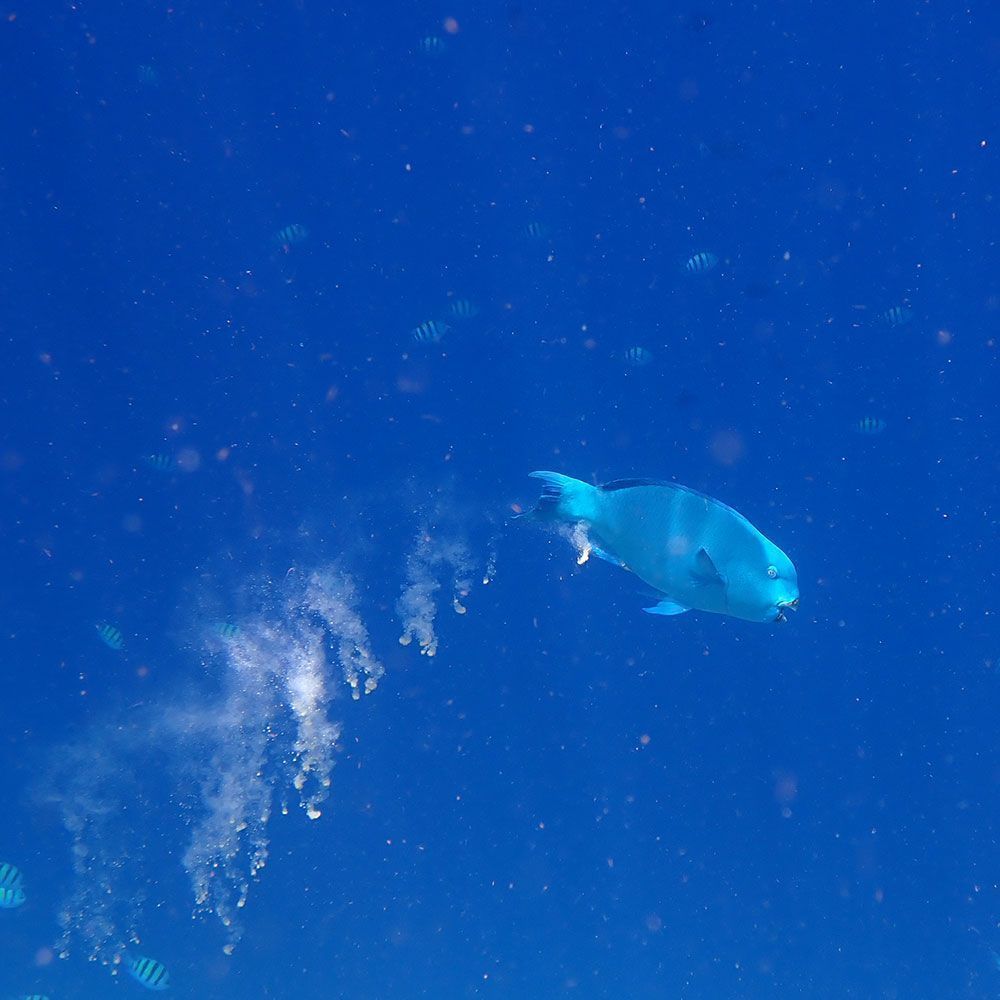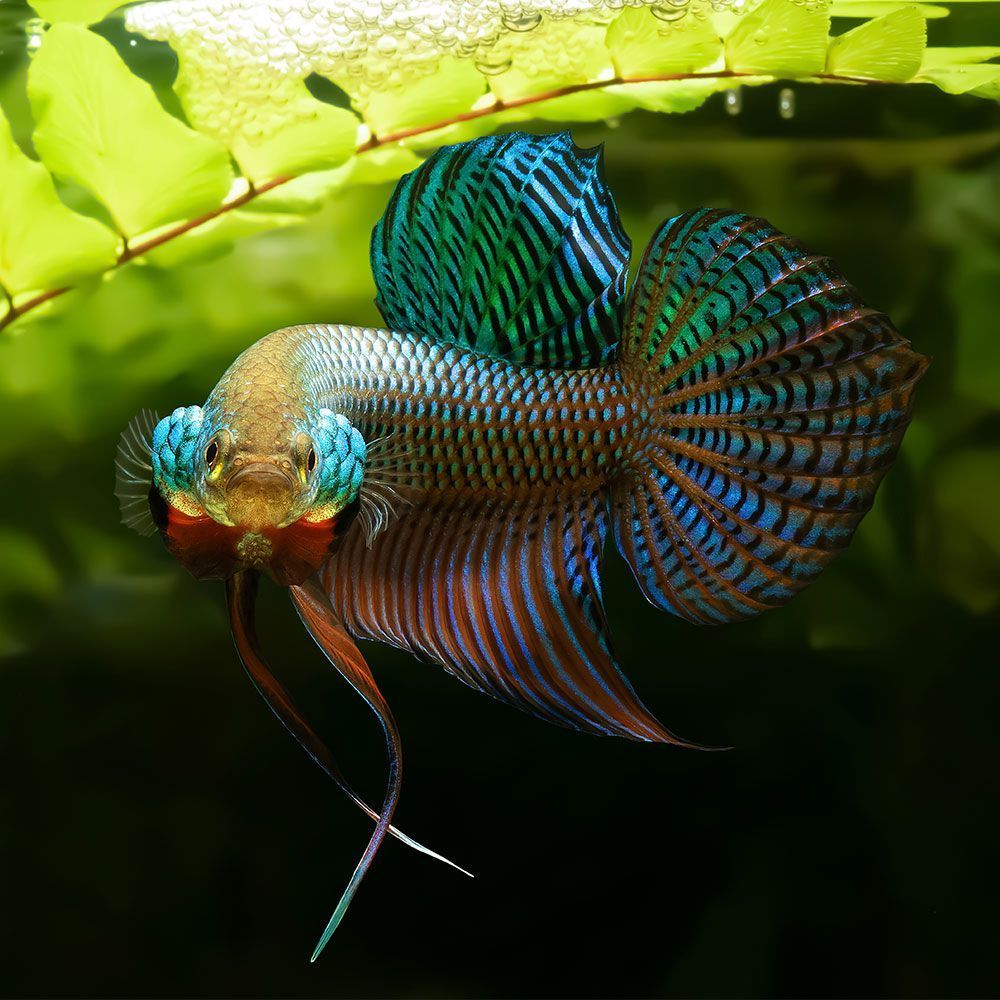Yes, all fish poop and expel their wastes. After eating, the food slowly goes through the fish’s digestive system – stomach and intestines. All nutrition gets absorbed into its bloodstream, and the remaining waste is then passed through the anal vent. The entire process may take days to complete.
According to the Centre for Whale Research (Western Australia), the blue whale can pass about 200 liters (53 gallons) of feces in one go!
Fish eat, digest, and then relieve themselves anywhere they feel. But that doesn’t mean that the natural water bodies are nothing but a solution of poop from aquatic animals. After all, feces get converted into other useful forms eventually!
So, if you want to unravel more about fish poop and other relevant things, let’s keep reading!
How do fish poop?
Fish have an anal vent called a cloaca to excrete solid waste. The cloaca is an opening right at the end of their alimentary canal which is behind their rear fin.
But some fish (bettas) pass both pee and poop from the same excretory vent, and some (discus) have designated vents for each.
The Siamese fighting fish (Betta splendens) is also known for defecating through the mouth and gills, especially if it’s scared or threatened. There can be many more such exceptions.
Similar to most vertebrates, fish also has a digestive system. Once the fish eats and the food reaches the system, the nutrients are absorbed into the body. The entire process happens very slowly while it goes through the stomach and intestines. Then finally, it passes through the anal vent as feces.
What does fish poop look like?

Well, the appearance of fish poop depends on their health. If the fish is healthy, the feces dissolve into the water as soon as it leaves its body.
However, if it’s sick – constipated or infected by a parasite – it won’t dissolve immediately. Instead, it will be long and stringy.
Usually, the color of healthy fish feces is brown to dark brown, but this can vary with various factors.
For instance, flakes are full of bloodworms. So, when a fish is fed flakes, the feces will seem reddish.
If you feed it more vegetables, it passes green fecal matter.
But, if you fast the fish or it is malnourished, the excreted solid will seem clearerto whitish or slightly yellowish or brownish. This is not even feces but is rather expelling the digestive tract mucus layer.
If the feces is completely white, stringy, lumpy, and seems to move or wiggle, it might have a parasitic or bacterial infection in the digestive tract.
Black poop, on the offside, says that a fish has constipation or its digestive tract is infected with a parasite. So if it’s a pet fish, seek a vet ASAP.
Bubbles in fish bowels indicate a lack of oxygen in the water, and fish need more air. It might be because the water temperature is too high, which expels the air. Or the tank is overcrowded, and other species are taking up air too fast.
What is the frequency of fish poop?
Fish excretes feces every few days because their digestion process takes much longer. But if a fish eats more frequently than another, its body will get trained to pass feces more frequently.
But there is no fixed formula to find the actual time fish need to defecate. So, if a specimen eats a healthy amount regularly, it’ll poop every 2 days. If there’s no routine and it consumes much less, it can take any time over 2 days.
On the other hand, a fish that didn’t eat for multiple days may defecate at least after 4 days. It might take longer!
Sometimes, defecation is delayed even if the fish gets overfed. This is because its digestive tract gets blocked with unprocessed food. So, it can pass the bowel only after the food gets digested entirely.
The frequency also varies with the species. For instance, betta fish defecation varies from once a day to five to six times a day.
What is the size of fish poop?
Scientists made an incredible revelation about fish feces size and found that they almost always all have a width of 0.6-1.5 mm. But, of course, the length varies based on the fish’s health and diet.
What is the quantity of fish poop?
The quantity of fish poop varies depending on the size of the fish and its diet. A big fish with a healthy diet will produce much more fecal matter than a small fish with a healthy diet. On the other hand, any fish with a poor diet will pass a lesser quantity of bowels than usual.
But, it’s known that fish turn 40% of the consumed food into feces. The composition of fish poop itself is, however, 90% water.
How does fish poop smell?
Fish poop gives away an extremely stubborn and foul smell in the aquarium, especially when it accumulates over days. This smell isn’t noticeable in wild water bodies, as it gets broken down by other organisms pretty soon.
What happens to fish poop in water?
When in the wild, fish feces float, get carried by the current, and eventually sink at some point. Then it starts disintegrating and dissolving. Once all the pieces get broken down into small pieces, they get decomposed in the water.
In the aquarium, fish feces settle down on the substrate and dissolve in the water with time. There will be some undissolved parts that must be taken out from the substrate. And the water must also be changed regularly to upkeep a healthy aquatic environment.
How does fish poop affect its environment?
Fish poop can have varying effects on its surroundings depending on where it is. So, let’s check all possibilities here.
What is the effect of fish poop in nature?
Fish feces has some nutritional value for some aquatic plants, like coral reefs – but not all. The feces are rich in phosphorus and nitrogen which works like fertilizer.
It also promotes algae growth in nature. This, in turn, becomes food for fish and other aquatic animals. In the wild, the water bodies are huge, so the effects of fish feces don’t turn toxic.
What is the effect of fish poop in an aquarium?
Unlike in the wild, the effect of fish fecal matter is pretty different in a controlled environment like the aquarium. So, let’s have a look here:
What happens to fish poop in aquarium water?
The bowels of fish can turn the tank water hazy and brownish if not tended over time. It can release lots of ammonia into the water and make it inhabitable for the fish.
If the tank is rich in certain kinds of bacteria, the ammonia will undergo the nitrogen cycle, get broken down into nitrite, and then nitrate.
But without proper and regular tank cleaning, it’ll eventually become toxic for all species. It also diminishes the amount of dissolved oxygen in the water. This is due to the bloom of heterotrophic bacteria that consume oxygen from the water.
How does fish poop affect plants in an aquarium?
Some aquatic plants like Hornwort, Amazon sword, Java moss, and others use the ammonia of fish poop as nutrients. However, if the fish poop is left for too long or there is too much poop compared to the plants, it can become toxic for them.
How does fish poop affect the décor?
Fish poop can promote algae growth in the aquarium decor surfaces. It can be a source of food for the species in your aquarium.
How is fish poop for other species in the fish tank?
Usually, fish never get any added nutrition by consuming their own feces. But some species like plecos, corydoras, and even some shrimps and snails consume fish waste.
On the flip side, goldfish eat their own feces because they are always hungry. Other species don’t usually show such habits, but if they do, it’s a sign of starvation.
If there is too much fish poop in the aquarium, it’ll only lie around, producing toxic by-products. That can be harmful both to the fish and other species and make them sick.
It can clog the gills of all fishes and make them produce excess mucus to protect the gill membrane.
A word from FishInAquarium
With the knowledge of the poop routine of fish, you can be more prepared when you get your own aquarium. And if you already have a setup, this will guide you to be more vigilant about your pet fish’s health.
With that said, if you found this article enlightening, make sure to share it with other fish enthusiasts. Embrace the endless facts about the fish’s digestive system together. But if you have more questions, drop us a mail, and we’ll resolve all your queries!


